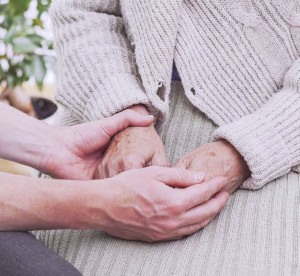With proper planning and support, caregivers can reduce some of the burdens associated with late-stage Alzheimer’s.

We all know we’ll face the loss of loved ones in life. That hard truth is difficult enough to accept. Alzheimer’s disease, however, adds an especially cruel twist to that expectation, says Valerie Wilson, MD, a geriatrician with Wake Forest Baptist Medical Center’s Sticht Center on Aging. “Alzheimer’s is one of the most difficult diseases for caregivers because, in a sense, it causes you to have to say goodbye to your loved more than once,” she says. “You lose them when you get that diagnosis of a terminal illness. Then, as the disease progresses, you lose them again when they no longer recognize you. And, you lose them a third time when they actually pass away.”
It’s that middle goodbye, the one where you become a stranger to your loved one, that’s usually the hardest for caregivers to bear. It’s also a sign that the disease is entering its final phase—one that comes with a litany of exhausting and challenging demands.
Identifying Late-Stage Alzheimer’s Disease
Because diagnostic tools have improved over the years, Alzheimer’s is increasingly diagnosed when a person is still in the early stages of the disease. This means many people can live with Alzheimer’s for a number of years after diagnosis—although the rate of progression is highly variable.
“Alzheimer’s tends to progress slower in the beginning stages and in the end stages,” says Dr. Wilson, who is involved in memory assessment at the Sticht Center. “The middle stages go by a bit faster. Data shows us the life expectancy after diagnosis can be anywhere from five to 18 years. Because it varies so much from person to person, the end stages of Alzheimer’s can last for a couple of months or a few years.”
As the disease progresses, the following symptoms become apparent:
• Difficulty naming or recognizing very familiar loved ones
• Inability to independently dress, groom, perform chores or maintain proper hygiene
• Reduced mobility
• Disrupted sleep or changing sleeping patterns
• Bladder and bowel control incontinence
• Personality and behavioral changes, including paranoia and delusions
In the final stages of Alzheimer’s disease a person will decline even more severely, becoming unable to carry on a conversation or control movements, such as sitting without support or even smiling. The person’s reflexes, muscle quality and ability to swallow may all become impaired.
“As a person enters the later stages of the disease, the caregiver really does struggle,” says Dr. Wilson. “There are physical strains that come with having to lift and dress your loved one, but the emotional stresses can be much harder than the physical ones.”
Dr. Wilson offers the following suggestions on approaching the final phase of your loved one’s disease:
Prepare as early as possible.

support you need during times of grief.
It’s ideal to start making preparations for the final stages of Alzheimer’s while your loved one is still in the early stages of the disease. Regardless of the current stage, however, it’s important that you act right away. “Whenever I assess a new patient of any stage, I recommend the family get advanced directives in place—specifically, a living will and healthcare power of attorney,” says Dr. Wilson. “To have these tasks and other end-of-life issues addressed beforehand takes a tremendous amount of stress and pressure off the caregiver.”
Ask for help and don’t isolate yourself.
Because people with late-stage Alzheimer’s must be monitored and cared for 24 hours a day, seven days a week, caregivers face nearly impossible demands on their time and energy. Therefore, it’s essential for you to seek help if you’re caring for someone in the final stages of the disease. If you have the financial resources, or your loved one has long-term care insurance, contact a home health agency for assistance. If that’s not an option, look to resources in your community that can either provide or direct you toward the help you need. These include local Alzheimer’s organizations, city and county senior services, hospital-associated support groups, churches and temples, and nonprofits that address aging issues. In addition to caregiving help, there are also many groups that assist with food delivery, grocery shopping and housekeeping.
Don’t forget to ask friends and family for help.
They, too, can lend a hand in many areas. Plus, they can provide you with added emotional support. “It’s very socially isolating to care for someone with dementia,” says Dr. Wilson. “And every caregiver should have some respite each day where he or she can have time to recuperate and refresh. Reaching out to family and friends can be one of the best things for you.”
Consider hospice care.
Alzheimer’s disease is a hospice-eligible diagnosis. As the disease advances and your loved one becomes less verbal, less mobile and eats less, it’s an option you should consider looking into. Hospice is a way to provide your loved one with comfortable end-of-life care while also removing some of the immense strains you face as a caregiver.
Don’t take your loved one’s symptoms personally.
It’s incredibly hurtful to not be recognized or remembered by your loved one. However, internalizing the experience can lead to more emotional pain. “This is probably the hardest thing to deal with,” says Dr. Wilson. “Something that helps is to remember that this is just a symptom of a disease; it’s nothing personal. We don’t get our feelings hurt when people exhibit physical symptoms they can’t control, so we should try to take the same approach to memory-related symptoms. Just because your mom or your dad doesn’t recognize you at this moment doesn’t mean they didn’t love you more than the whole world when their brain was operating normally. You have to remember they can’t control this symptom.”
Adjust medications.
As a person with Alzheimer’s moves into the final stages of the disease, it may be time to wean him or her off of some medications—with a doctor’s guidance, of course. “Once a person is in the advanced stages of dementia and has lost a lot of functioning, there’s not always a whole lot left to preserve,” says Dr. Wilson. “Of course there are medications that can be used for symptom management, such as ones that help control agitation. These changes don’t mean you’re giving up on your loved one; they just mean you’re meeting the needs of his or her disease stage.”
Deal with grief when it appears.
Grief is a fact of life for Alzheimer’s caregivers. Whether you’re at your first, second or final goodbye, it’s important to seek help in coping with it. Certified grief counselors are trained to help caregivers handle all forms of grief, including disease related emotional loss and anticipatory grief. Hospice provides grief-counseling services. If your loved one isn’t currently in hospice, check with a local support group for a referral to a grief counselor. Your church or temple might also be a good place to go for help. ■










